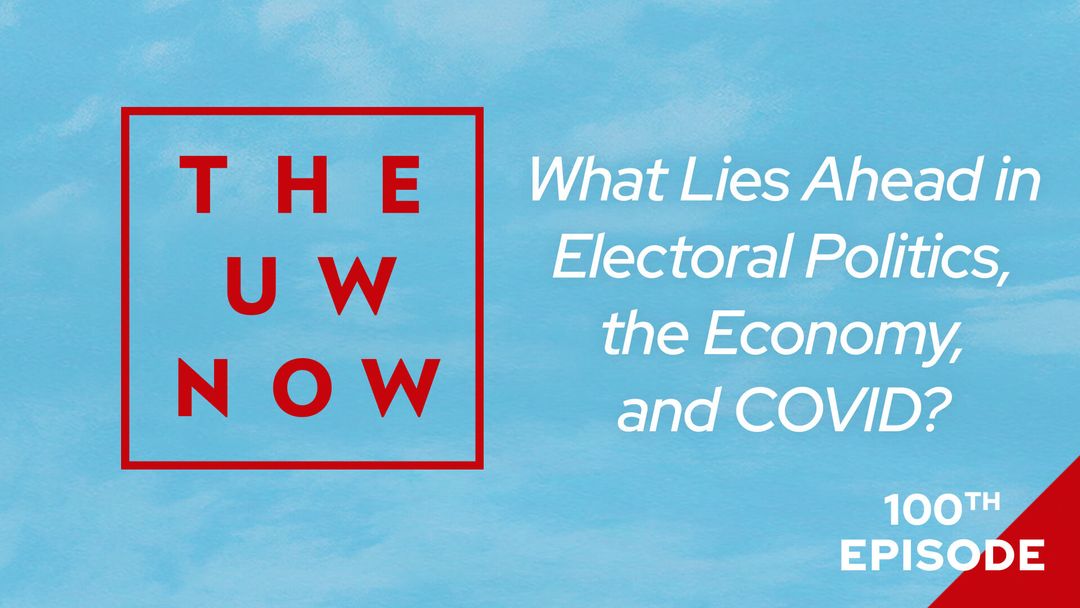If 2024 was an unpredictable year — and the year included many surprises, including the re-election of a previously defeated presidential candidate, the sudden fall of Syria’s Assad regime, and continued economic growth in spite of relatively high interest rates — 2025 seems poised to be highly predictable.
“It’s going to be a Trump-centric year,” says Barry Burden, UW–Madison’s Lyons Family Chair in Electoral Politics. “It wasn’t that the electorate was necessarily endorsing his policy goals. It was about a variety of things, some of them bigger than him, but Trump appears to be doubling down on his policy promises and in recent interviews since the election.”
Burden joined host Mike Knetter, CEO of the Wisconsin Foundation and Alumni Association, for a UW Now Livestream on December 17 to discuss predications for 2025. Other guests included Dana Peterson MS’02, an economist with The Conference Board, and Jon Pevehouse, a UW professor of political science who specializes in international relations. All three looked at ways that Donald Trump’s return to power will shape the nation and the world.
Burden noted that, though Republicans hold the presidency and both houses of Congress, the party’s majorities are narrow, and he predicts that this will pose a problem for Trump’s agenda.
In the House of Representatives, said Burden, “it looks like it will be a 215 Democratic caucus to a 217 Republican caucus. That’s a two-seat majority, a very narrow margin. In the Senate, it’ll be 53–47, so a little healthier margin. But in both chambers, he has some really difficult members who are not going to want to go along with him.”
He also predicts that Trump will have an easy time getting tax cuts through but will face pushback on enacting tariffs and on immigration policies.
“I think a lot of unilateral action things like executive orders, executive actions, decrees posts on social media declaring that things will be done,” Burden said. “Trump set a modern record for executive orders in his first term.”
Peterson predicted that economic growth would slow but not stop in 2025.
“Our expectation at The Conference Board is for GDP to grow by 2 percent in 2025,” she said. It’s a little slower than this year. We’re looking at 2.7 percent in 2024, but still the U.S. can get along at 2 percent and be just fine for the global economy. We think the unemployment rate’s going to stay pretty low in the U.S. at 4.1 percent because companies aren’t really looking to let go of their workers.”
However, she predicts that inflation may rise again, if the Trump administration pursues tariffs and expels immigrants. Deporting immigrants can exacerbate the country’s labor shortage, and while the tariff plan could increase domestic manufacturing, it would also increase costs. “When you bring things back to the U.S., you have to pay the U.S. wage,” she said. “You also have to pay for materials to build new factories. All those things generate growth and jobs, but it’s also quite inflationary.”
Looking at three areas of concern for foreign relations, Pevehouse said the big question the U.S. faces is whether we have left the post–Cold War era. “Are we going back to a world of containment, economic containment, proxy wars,” he asked, “or something slightly less than that?”
Pevehouse said he expects that a second Trump administration will have to confront Israel’s expansionist moves or else see conflict in the Middle East escalate, though the incoming president will try to increase friendly relations between the region’s major powers, Israel and Saudi Arabia.
“Trump is going to try to get more permanent and friendly relations between Israel and the Saudis,” he said. “I don’t think that is likely.”
Pevehouse foresees a slow withdrawal of support for Ukraine in its war with Russia. He suggested that Trump might propose a peace deal that Ukraine would reject, and then cut off support to force Ukraine to accept concessions to Russia. With respect to China, Pevehouse predicts that Trump will follow through with tariffs, which could lead to increasing rivalry.
“I would not predict any kind of invasion of Taiwan by China,” he said. “But … the biggest threat to this region is a [China] that is in trouble — not that is strong, but one that is shrinking — where Xi Jinping himself feels like his personal control is up for grabs. [He might] launch some kind of a military excursion — maybe against Taiwan, maybe into the South China Sea against the Spratleys — to try to bring some nationalist fervor back to his regime.”
After the three speakers finished, Knetter brought forward questions from viewers. Ultimately, Burden noted that he expects political conflict to continue.
“I would expect Trump will … be challenged in the courts — Democrats and civil rights groups and others will immediately file suit,” he said. “And Trump doesn’t mind that. He comes from a litigious background. He was involved in lawsuits when he was in the real estate development business in New York, and I think sort of enjoys it, relishes it, and feels like he can be successful there. So that’s not going to be something that deters him, but I think it will be a lot of the story just given the environment that he faces over these next couple of years.”
